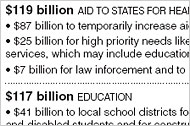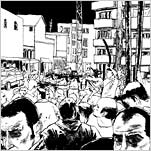WASHINGTON — President-elect Barack Obama’s economic agenda advanced rapidly in Congress on Thursday as the Senate voted to release the second half of the financial industry bailout fund and House Democrats unveiled an $825 billion fiscal recovery plan aimed at putting millions of unemployed Americans back to work.
Multimedia
Blog

The Caucus
The latest on President Obama, the new administration and other news from Washington and around the nation. Join the discussion.
The Senate action, by a vote of 52 to 42, spares Mr. Obama a messy legislative fight just as he takes office and gives him a $350 billion war chest to further stabilize the financial sector. The vote came amid renewed distress in the banking industry, including further deterioration of Citigroup and a pitch for more government aid by the Bank of America.
Mr. Obama had personally lobbied reluctant senators to release the money. His top economic adviser, Lawrence H. Summers, made three visits to the Capitol and sent two letters to reassure lawmakers that the program would be better managed.
In the most recent letter, delivered shortly before the vote, Mr. Summers promised to use $50 billion to $100 billion for “a sweeping effort to address the foreclosure crisis.” He promised tough oversight and clear tracking of how the money is used, and new restrictions on executive pay at firms that receive help.
The vote was an early test for Mr. Obama, in which 6 Republicans joined 46 Democrats to release the money and keep the new administration’s agenda on track.
After personal entreaties from Mr. Obama, all but one of the seven Democratic freshmen senators voted to release the money, including Senators Mark Udall of Colorado and Tom Udall of New Mexico, who as House members twice voted against the original bailout bill.
In a statement, the president-elect applauded the outcome.
“I know this wasn’t an easy vote because of the frustration so many of us share about how the first half of this plan was implemented,” Mr. Obama said. “Now my pledge is to change the way this plan is implemented and keep faith with the American taxpayer.”
Rahm Emanuel, the incoming White House chief of staff who huddled with Republicans on Wednesday to make the case for the money, saw the outcome as the first major win for the new administration.
“Obviously we would have preferred something else,” Mr. Emanuel said. “But this was the first play of the game, and we threw an 80-yard pass.”
The House may still vote on the bailout money, but the point is moot because the law requires action by both chambers to block the funds. Instead, House Democrats said they could focus on their aggressive timetable for the $825 billion stimulus measure.
That package, developed in partnership with Mr. Obama, includes huge increases in spending on education, aid to states for Medicaid costs, temporary increases in jobless benefits and a vast array of public works projects to create jobs.
The stimulus plan is the centerpiece of Mr. Obama’s early agenda and seeks to make good on some of his signature campaign promises, including an income tax cut for most Americans earning less than $200,000 a year.
Under the plan, individuals would receive up to $500 and families up to $1,000. The money would be delivered through paychecks as a reduction in Social Security withholdings, and is intended to bolster consumer spending by giving a small lift to household pocketbooks.
Some of the other major components of the plan include $87 billion for a temporary increase in aid to states for Medicaid costs; $79 billion in aid to local school districts and public colleges to prevent cutbacks; $90 billion in infrastructure spending, and $54 billion to encourage energy production from renewable sources.
The Senate is developing its own version of the stimulus bill, and intense haggling is expected over the next few weeks. The House speaker, Nancy Pelosi of California, has said the bill must pass by mid-February or she will cancel the Presidents’ Day recess.
The House version, introduced by the Appropriations Committee chairman, Representative David R. Obey, Democrat of Wisconsin, contains the broad parameters expected in the final product: roughly $550 billion in spending and $275 billion in tax cuts over two years. The House is expected to vote on the bill the week of Jan 26.
Mr. Obey, at a news conference, said that without the recovery plan, Americans would face a dire recession and unemployment of 12 percent. He said that even such a huge stimulus might not be enough to stabilize the economy.
“You have to look at this bill as not a salvation for the economy by any means,” he said, sitting at his desk in the Capitol with a window behind him overlooking the Washington Monument. “It is simply the largest effort by any legislative body on the planet to try to take government action to prevent economic catastrophe, and even that may be insufficient.”
Mr. Obama is expected to travel to hard-hit Ohio on Friday to trumpet aspects of the plan, particularly the renewable energy provisions and the aid for struggling Americans, including a further extension of jobless benefits, new health insurance subsidies for the unemployed and an increase in food stamps.
Although Mr. Obama promised to collaborate with Republicans and consider all ideas, the draft proposal put forward emphasized mostly Democratic principles of helping middle-class workers with tax relief and helping the unemployed pay health care costs.
Republican leaders quickly criticized the plan.
“This is the first time Republicans and the American people have seen any specifics on the proposal Congressional Democrats intend to pass, and what we’re seeing is disappointing,” the Republican leader, Representative John A. Boehner of Ohio, said in a statement. “The plan released this morning by Congressional Democrats was developed with no Republican input and appears to be grounded in the flawed notion that we can simply borrow and spend our way back to prosperity.”
Mr. Boehner and other Republicans are planning to push for deeper and more permanent tax cuts that they say will do a better job of encouraging economic growth.
Among lawmakers in both parties, there has been substantial outrage on Capitol Hill over the Bush administration’s management of the bailout program. Some senators said the new worries over Citigroup and Bank of America had influenced their vote.
Many Republicans said they were angered that the administration had used the rescue money to help General Motors and Chrysler, and they demanded assurances from the Obama administration that it would not similarly aid individual industries.
In urging senators to release the money, the majority leader, Senator Harry Reid of Nevada, gave an impassioned speech, focused on Mr. Obama. “We must give our new president every tool to try to fix this economy,” Mr. Reid said.
The Republican leader, Senator Mitch McConnell of Kentucky, who voted against releasing the money, said he appreciated Mr. Obama’s assurances that the bailout program would be used to stabilize the financial system. But Mr. McConnell said, “the incoming administration also indicated it would use the money in ways I cannot support.”
Senator John McCain, Republican of Arizona, who supported the original bailout, voted against releasing the money.
Mr. Obama, in a meeting with the editorial board of The Washington Post, said that he would convene a “fiscal responsibility summit” in February to focus on solving long-term problems with the economy, including the rising costs of Social Security and Medicare.
At his news conference, Mr. Obey said that the bill would create a board to oversee how the stimulus money was being spent and that money allocated under the recovery bill would be tracked on a new Web site.














